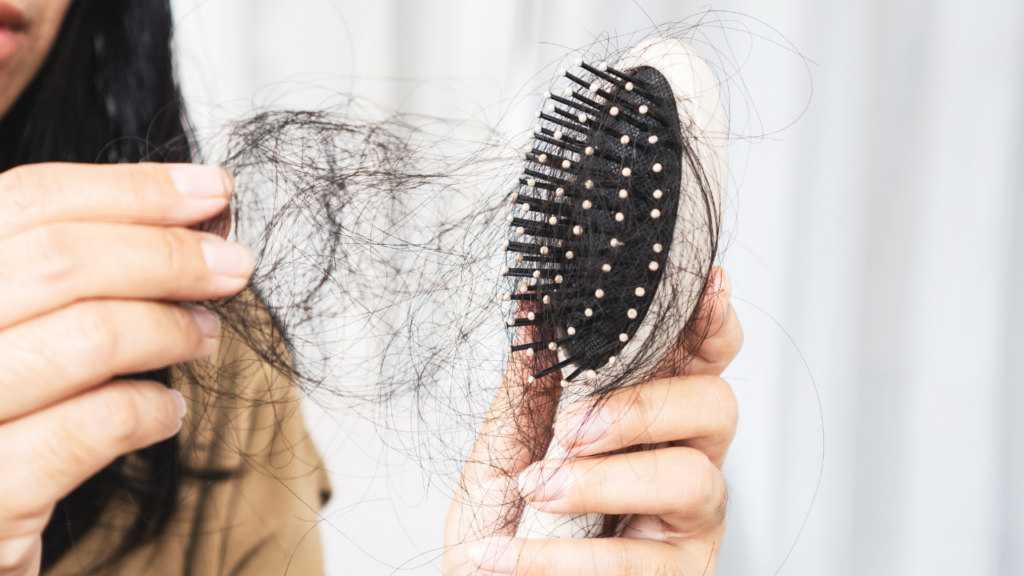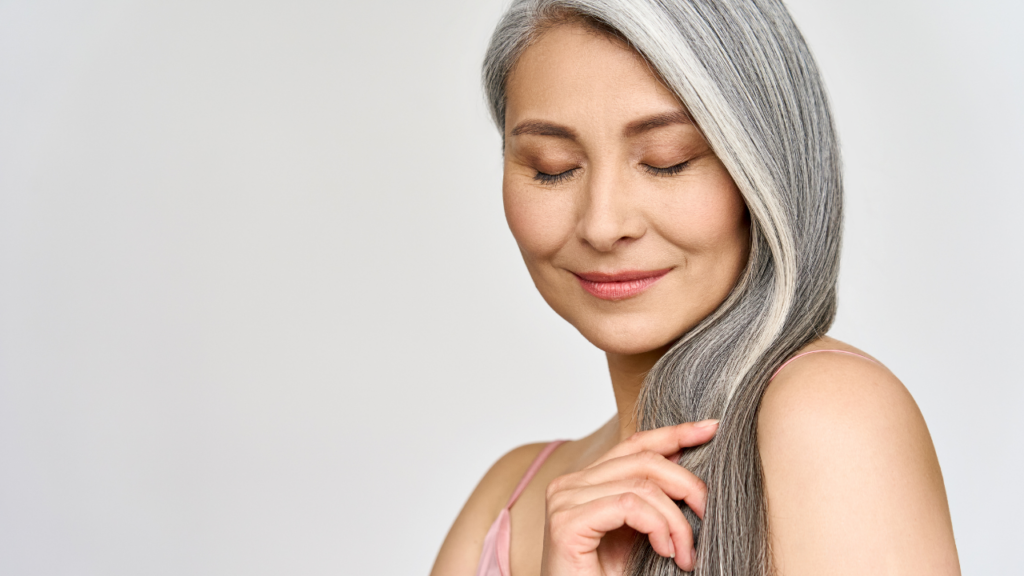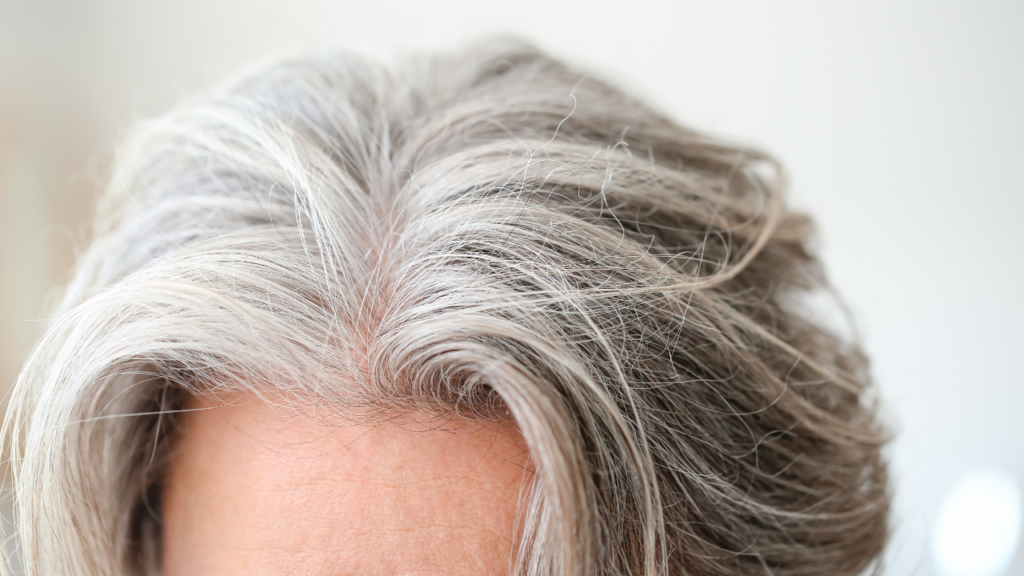|
Getting your Trinity Audio player ready...
|
Hair loss can be a frustrating and disheartening experience for many. While chasing after strong and healthy hair, peptides have emerged as a promising ingredient in the realm of hair care, with the potential to revitalize hair follicles and promote healthy hair growth. Understanding how they work can make a big difference in your quest for luscious locks.
In this article, we’ll explore what peptides are, how they benefit the hair and scalp, and how you can incorporate them into your hair care routine for optimal results.
Understanding Peptides and Their Role in Hair Growth
Peptides are small chains of amino acids – the building blocks of proteins, crucial to biological functions, including the health of our hair. These mighty molecules play a pivotal role in signaling and orchestrating a variety of biological processes. In the context of hair growth, studies show peptides can potentially influence the hair at the follicular level. They’ve been associated with stimulating hair growth, improving the health of the scalp, and reinforcing the hair shaft. In particular, men and women looking to combat the signs of aging on the scalp or managing conditions like androgenetic alopecia may find peptides to be an asset in their hair care regimen.
Different Types of Peptides in Hair Growth
GHK-Cu
GHK-Cu is a naturally occurring copper peptide with a vast array of rejuvenating properties. It has been observed in a clinical trial that GHK-Cu improve hair density and thickness by enhancing follicle size. GHK basic and GHK-Cu, in particular, have been observed to revitalize the scalp and potentially reverse hair loss. These injectable peptides could also promote wound healing, which could indirectly support a healthier scalp environment conducive to hair growth.

AHK-Cu
AHK-Cu, a copper-peptide complex, is recognized for its ability to promote hair growth and revitalize the hair follicles. Copper peptides like AHK-Cu have been shown to stimulate the production of extracellular matrix proteins, enhance follicular enlargement, and directly stimulate hair growth. The presence of copper is critical for various enzymatic processes that strengthen the hair follicles and improve scalp health. By enhancing angiogenesis and increasing follicle size, AHK-Cu can lead to thicker, more vibrant hair.
PAL-AHK
PAL-AHK, a synthetic peptide, plays a pivotal role in promoting hair growth and improving hair health. This peptide, composed of a sequence of amino acids linked to a palmitic acid, enhances its ability to penetrate the scalp and reach the hair follicles effectively. PAL-AHK operates by mimicking the growth factors that naturally stimulate hair follicles, thereby encouraging the proliferation of hair follicle cells and extending the anagen (growth) phase of the hair cycle. This results in the promotion of hair density, thickness, and overall hair growth.
Follistatin-344
Follistatin-344 is a peptide reputed for its muscle-building properties but has recently emerged in the field of hair regrowth. It works by counteracting myostatin, which can also influence hair follicle signals in the scalp. Product review of follistatin-344 has suggested that it might be useful in promoting hair health and thereby promoting hair volume and density.
Folitin
Folitin, a peptide known for its role in enhancing hair health, operates by stimulating the hair follicles, promoting a more robust growth cycle. It targets the underlying molecular pathways that are crucial for the development and maintenance of hair. By activating specific signaling pathways, Folitin can potentially increase the proliferation of dermal papilla cells, which are key to initiating hair growth and preventing hair loss.
PTD-DBM
PTD-DBM is a peptide that has garnered attention for its targeted approach in hair regrowth protocols. It is a modified peptide that acts directly on the WNT signaling pathway, a critical regulator of hair development and blood circulation. Initial studies suggest that when PTD-DBM is used as part of a topical formula, it could be instrumental in reviving dormant hair follicles, particularly when it comes to the diffuse hair loss seen in conditions like stress-induced alopecia.
CJC-1295
CJC-1295 is a growth hormone-releasing hormone (GHRH) analog known to stimulate the release of growth hormone (GH) from the pituitary gland. Its indirect effects on hair health can be attributed to the increased serum levels of GH, which in turn can enhance the growth and regeneration of hair follicles.
Growth hormone plays a pivotal role in the regulation of cell growth and regeneration, processes that are essential for maintaining healthy hair. Through its action on GH release, CJC-1295 may contribute to improved hair density, thickness, and possibly a decrease in hair loss.
GHRP-2
GHRP-2, or Growth Hormone Releasing Peptide-2, functions by stimulating the pituitary gland to release growth hormone, similar to CJC-1295, but through a different receptor pathway. This increase in growth hormone levels can significantly impact hair growth by enhancing the cellular turnover and regeneration of hair follicles. The physiological effects of GHRP-2 on hair include the potential to invigorate dormant hair follicles, improve hair thickness, and support the overall health of the scalp.
BPC-157
BPC-157, a body protection compound peptide, has gained attention for its remarkable healing properties, including its potential benefits for hair health. Its mechanism involves the modulation of angiogenesis (the formation of new blood vessels) and the enhancement of various growth factor levels, which are crucial for repairing damaged tissues and supporting hair health. By improving blood flow to the scalp and stimulating hair follicle cells, BPC-157 could play a significant role in promoting hair growth and preventing hair loss.

Collagen Peptides
Collagen peptides are acclaimed for their role in skin health and anti-aging, but their benefits also extend to the hair. Incorporated naturally in several hair growth serum formulations, these peptides contribute to the construction of hair by imbuing the scalp with essential amino acids, maintaining the integrity of the hair follicle and hair shaft, and assisting in the building of blood vessels in the scalp. This, in turn, contributes to stronger follicles, potentially reducing hair loss in individuals.
Commercial Products and Peptides in Hair Growth
The cosmetic industry has not been slow to harness the potential of peptides in hair care products. Beverages and nutritional supplements have also jumped on the bandwagon, offering collagen peptides in drinks form, touting enhanced absorption and benefits for skin and hair alike. The use of commercial products featuring peptides, such as hair growth serums rich in pal-ahk or tb-500, speaks to the growing trend of using peptide science in everyday hair care routines.
Scientific Evidence and Comprehensive Review on Peptides in Hair Growth
A thorough examination of existing literature reveals that the scientific community has noticed tangible improvements in hair regrowth, scalp revitalization, and overall hair health due to the use of peptides. Fibroblasts in the skin synthesizing collagen and elastin benefit from the presence of peptides, translating to increased scalp elasticity and healthier hair. Nonetheless, a singular clinical study might not capture the extensive picture, and ongoing research aims to establish a more detailed understanding of these compounds.
Safety and Potential Side Effects of Peptides
While peptides present a promising, natural alternative to traditional hair loss treatments, they are not without a safety profile that needs close consideration. Side effects, though relatively rare and minor, must not be disregarded. To date, peptides such as bpc-157 and thymosin beta 4 have been observed to have a safe profile when used correctly.
Dosing and Cycles for Different Peptides in Hair Growth
The efficacy of peptide treatments can depend heavily on the dosing and cycles, and there’s no one-size-fits-all approach. A properly planned schedule typically involves a series of sessions with specified amounts, tailored to match the individual’s needs. The personalization of peptide therapies, based on hair loss patterns and scalp conditions, can have a significant impact on results.
Factors Influencing the Effectiveness of Peptides in Hair Growth
Various factors influence the effectiveness of peptides in promoting hair growth. They range from the biological and genetic predispositions of the individual, stress levels, nutrient deficiencies, and the specific type of hair loss being addressed. Establishing an environment that allows for optimal peptide absorption is also critical for achieving desired hair growth outcomes.
Personalized Peptide Solutions and Custom Cycles
Given the unique nature of hair loss and scalp health, there is an increasing demand for personalized peptide solutions. Custom peptide cycles are tailored to the individual, taking into account personal medical history, specific hair loss conditions, and current scalp health. This customized approach helps ensure not only effectiveness but also improves safety by minimizing potential side effects.
Expert Opinions and Verdict on Peptides for Hair Growth
Expert opinions on the use of peptides for hair growth are varied but generally optimistic. Dermatologists and trichologists often cite the promising results from clinical tests when recommending peptides as part of hair restoration strategies, especially for those seeking less invasive and more natural solutions than hair transplant surgery.
Purchasing and Using Peptides for Hair Growth
Securing quality peptides necessitates due diligence, as the market is saturated with myriad options. Prospective buyers need to scrutinize product descriptions and verify the purity and origin of peptides. It’s recommended to opt for peptides that have undergone stringent testing for safety and effectiveness.
In Summary
Peptides are evolving into a significant force in the realm of hair growth. Their multifaceted nature allows them to address issues like follicle health on the scalp, boost collagen production, and thereby encourage hair regrowth. While their potential is undeniable, one must employ caution with sourcing and usage to mitigate any potential risks associated with their application.

FAQ
What are peptides and how do they contribute to healthy hair growth?
Peptides are short strings of amino acids that serve as protein building blocks. They can stimulate hair follicles on the scalp to produce hair, improve blood flow, and increase hair shaft protein synthesis, all of which contribute to healthier, thicker hair.
What are the benefits of using peptides for promoting hair growth?
Peptides can help increase hair density, improve scalp health, and reinforce hair structure by enhancing collagen and elastin production. This leads to reduced hair loss and a fuller hair appearance.
Are there any potential side effects or risks associated with using peptides for hair growth?
While peptides are generally considered safe for hair growth, some individuals may experience minimal side effects. It’s vital to consult with a healthcare provider before starting any new supplement or topical treatment for hair growth.
How should peptides for healthy hair growth be incorporated into a hair care routine?
Peptides can be part of a daily hair care regimen through topical serums, injectable therapies, or nutritional supplements under professional guidance to maximize hair regrowth potential with minimum risk.
Are there any specific types of peptides that are particularly effective for stimulating hair growth?
Specific peptides, such as GHK-Cu, collagen peptides, and PTD-DBM, have shown promise in stimulating hair regrowth and improving overall hair health in clinical studies.
Disclaimer: Please note that many peptide therapies are not FDA-approved and their efficacy and safety have not been fully established. It is crucial to consult with your healthcare provider before starting any new supplements or treatments, including peptide therapy.
References
Uno, Hideo, and Sotaro Kurata. “Chemical agents and peptides affect hair growth.” Journal of investigative dermatology 101, no. 1 (1993): S143-S147.
Anastassakis, Konstantinos. “Copper Tripeptides Copper tripeptides.” In Androgenetic Alopecia From A to Z: Vol. 2 Drugs, Herbs, Nutrition and Supplements, pp. 225-230. Cham: Springer International Publishing, 2022.
Kecel-Gunduza, Serda, Esra Kocb, Bilge Bicaka, Yagmur Kokcub, Aysen E. Ozela, and Sevim Akyuzc. “IN SILICO ANALYSIS FOR CHARACTERIZING THE STRUCTURE AND BINDING PROPERTIES OF ALA-HIS-LYS (AHK) TRIPEPTIDE.” The Online Journal of Science and Technology-July 10, no. 3 (2020).
Lee, Soung-Hoon, Seol Hwa Seo, Dong-Hwan Lee, Long-Quan Pi, Won-Soo Lee, and Kang-Yell Choi. “Targeting of CXXC5 by a competing peptide stimulates hair regrowth and wound-induced hair neogenesis.” Journal of Investigative Dermatology 137, no. 11 (2017): 2260-2269.
Kim, Yujin, Jung Ok Lee, Jung Min Lee, Mun-Hoe Lee, Hyeong-Min Kim, Hee-Chul Chung, Do-Un Kim, Jin-Hee Lee, and Beom Joon Kim. “Low Molecular Weight Collagen Peptide (LMWCP) Promotes Hair Growth by Activating the Wnt/GSK-3β/β-Catenin Signaling Pathway.” Journal of Microbiology and Biotechnology 34, no. 1 (2024): 17.



